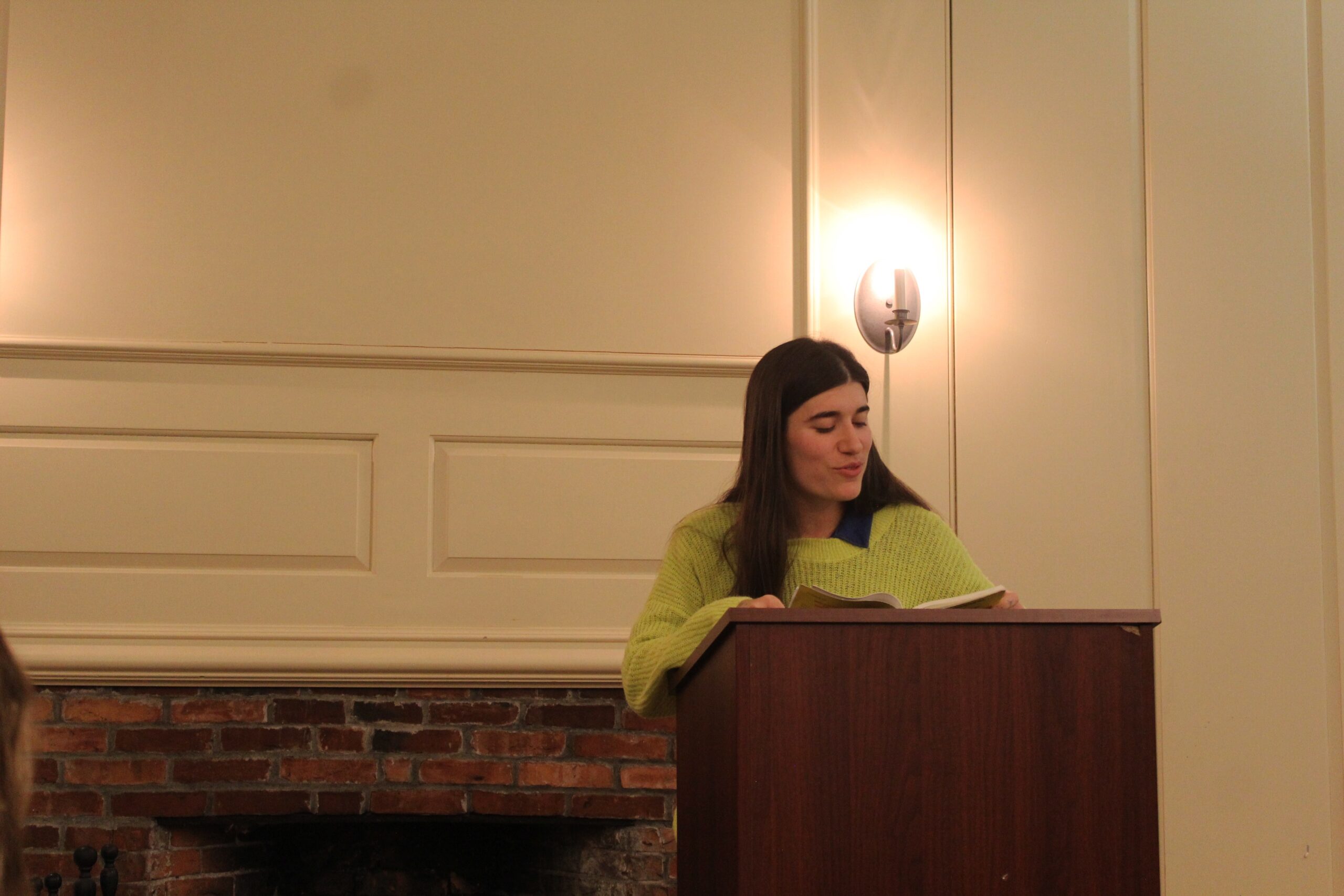Poet Tolchinsky speaks on Bowdoin experience and boxing in ADP Society reading
November 15, 2024
 Carolina Weatherall
Carolina WeatherallRaisa Tolchinsky ’17 packs a punch. Literally.
The author, reading from her recently published poetry collection entitled “Glass Jaw,” was the featured speaker this Thursday at the Massachusetts Hall Faculty Room. Her lecture, organized by Professor of English Brock Clarke, was another installment of the Alpha Delta Phi Society Visiting Writers Series.
Tolchinsky currently serves as the Creative Writing Specialist at Harvard Divinity School after a year-long stint as the writer-in-residence at Phillips Exeter Academy. Her poetry has been featured in the Boston Review, the Michigan Quarterly Review and the Kenyon Review. On top of all of that, she is a Bowdoin alum.
“I think [Bowdoin] taught me how to be with uncertainty, which I think is really important for the writing process,” Tolchinsky said. “I think that [the] practice of hearing other people listening deeply to [my poetry] and all these different angles refracted in all these different ways through different classes, they felt like little clues along the way.”
She said that sense of uncertainty allowed her to be comfortable with the feedback, which she received from Clarke during her time at the College. He also introduced her at the event.
“These poems are violent,” Clarke said during his introductory remarks. “They are ecstatic, full of characters who seek release, and sometimes find it too, but just as often, they find themselves mired deeper in things from which they need release in the first place.”
The collection’s violence and sense of release were on display during the event, as the collection of poems grappled with womanhood, life in New York City and Tolchinsky’s three-year stint as a boxer.
“I think boxing is one of many things where you feel like you’ve dropped down a rabbit hole, and New York feels that way too. You find yourself in this world, and I think I didn’t understand it at all,” Tolchinsky said.
That fascination with describing what seems indescribable was the driving impulse for “Glass Jaw.”
“When you’re sparring with someone, you don’t have the words for it. I became sort of obsessive around it and also trying to understand myself in that strange world that I had never been in before,” Tolchinsky said.
Beyond boxing, Tolchinsky spoke frankly and earnestly about her artistic process, taking questions from students, faculty and community members after the reading.
When one audience member asked her what she does with poems she writes but doesn’t like, Tolchinsky focused on the process.
“I think for a long time, I was like, ‘This is evidence that I can’t do it,’” Tolchinsky said, “Now I feel much kinder to those attempts. It feels like the voice inside is like, ‘Oh, you’re trying to talk about or write about this hard thing.’”
Tolchinsky said that arranging the collection was one of the most challenging parts of writing “Glass Jaw.” Among these challenges was the sheer amount of poetry she had to organize. She had so many poems that she decided to add a second and, later, a third section to the book to incorporate them.
These added poems incorporate more mythic themes, like the centaur or Dante’s “Inferno,” to capture the intensity of the scenes. Jack Twining ’27, an audience member, found Tolchinsky’s use of Dante inspiring and became interested in incorporating the Italian writer into his own poetry.
Towards the end of the event, Tolchinsky touched upon her life as a writer and the potential for loneliness.
“Sometimes [being a writer] is lonely. Sometimes, when you’re faced with a draft that you can’t get right, it feels like me facing that page and myself,” Tolchinsky said.
Tolchinsky noted that writing could also be about connection and credits collaborative communities like colleges for assisting her life as a writer. Her best friend, who she met at Bowdoin, was in the audience.
“The deep care of friendships feels like part of my writing,” Tolchinsky said. “Whether or not those [friends] are writers—the people who can hear me and be with me.”

Comments
Before submitting a comment, please review our comment policy. Some key points from the policy: